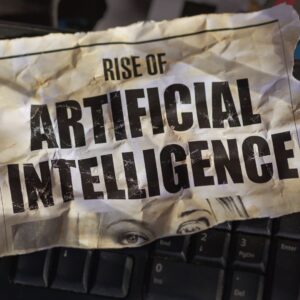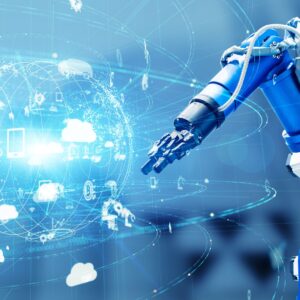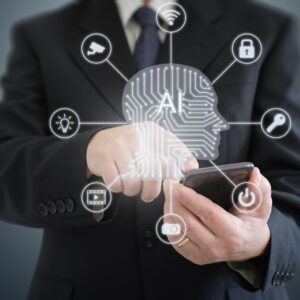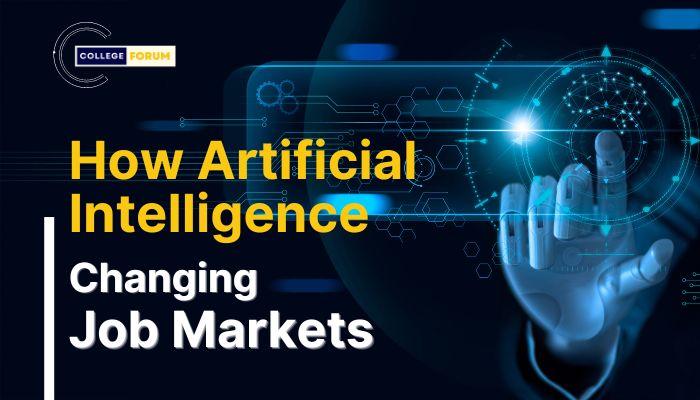Introduction
In today’s rapidly evolving technological landscape, artificial intelligence (AI) stands out as one of the most transformative forces impacting various industries and job markets. As students poised to enter the workforce, understanding the implications of AI is crucial. This comprehensive blog aims to elucidate how artificial intelligence is reshaping job markets and what it means for future job seekers.
The Rise of Artificial Intelligence

Artificial intelligence, in its simplest form, refers to the simulation of human intelligence in machines programmed to think and learn like humans. This technology encompasses various subfields such as machine learning, natural language processing, robotics, and computer vision. AI is revolutionizing how businesses operate, driving efficiencies, enhancing customer experiences, and creating new opportunities.
Historical Context and Evolution
The concept of AI has been around since the mid-20th century, with early pioneers like Alan Turing and John McCarthy laying the groundwork. However, it wasn’t until the last decade that AI started to realize its potential, thanks to advancements in computing power, big data, and sophisticated algorithms. Today, AI is integrated into everyday applications, from virtual assistants like Siri and Alexa to recommendation algorithms on Netflix and Amazon.
AI’s Impact on Various Industries

AI’s influence spans across numerous sectors, each experiencing unique transformations.
Healthcare
In healthcare, AI aids in diagnosing diseases, personalizing treatment plans, and streamlining administrative processes. AI-powered diagnostic tools can analyze medical images with remarkable accuracy, often surpassing human radiologists. Additionally, AI algorithms can predict patient outcomes and suggest optimal treatment pathways, enhancing patient care and reducing costs.
Finance
The financial industry leverages AI for fraud detection, algorithmic trading, and personalized banking services. AI systems analyze vast datasets in real-time, identifying fraudulent activities that might go unnoticed by human analysts. Moreover, AI-driven trading algorithms execute trades at high speeds, maximizing profits and reducing risks.
Retail
Retail businesses use AI to enhance customer experiences through personalized recommendations, chatbots, and inventory management. AI analyzes customer data to provide tailored shopping experiences, improving satisfaction and loyalty. In warehouses, AI-driven robots manage inventory efficiently, reducing operational costs and minimizing human error.
Manufacturing
AI revolutionizes manufacturing through predictive maintenance, quality control, and supply chain optimization. Predictive maintenance systems forecast equipment failures before they occur, reducing downtime and maintenance costs. AI-powered quality control systems ensure products meet stringent standards, enhancing product reliability.
Education
In education, AI personalizes learning experiences, automates administrative tasks, and provides intelligent tutoring systems. Adaptive learning platforms tailor educational content to individual student needs, improving learning outcomes. AI chatbots handle routine inquiries, freeing educators to focus on teaching.
Job Market Transformations

As AI permeates various industries, its impact on the job market is profound and multifaceted.
Job Displacement and Creation
A common concern is that AI will displace jobs, rendering certain roles obsolete. Jobs involving repetitive and routine tasks are most vulnerable to automation. For instance, assembly line workers, data entry clerks, and telemarketers face a high risk of displacement due to AI-driven automation.
However, AI also creates new job opportunities, particularly in fields requiring advanced technical skills. Roles such as AI specialists, data scientists, and robotics engineers are in high demand. Additionally, AI fosters the creation of entirely new industries and business models, generating jobs that previously did not exist.
Skill Shifts
The advent of AI necessitates a shift in the skills required by the workforce. Technical skills related to AI, machine learning, and data science are increasingly valuable. However, soft skills such as creativity, critical thinking, and emotional intelligence remain crucial. As AI handles more technical and routine tasks, human workers must focus on tasks requiring empathy, strategic thinking, and complex problem-solving.
Upskilling and Reskilling
To thrive in an AI-driven job market, continuous learning and skill development are essential. Upskilling involves enhancing existing skills, while reskilling entails learning entirely new skills. Educational institutions and employers must collaborate to provide training programs that equip workers with the necessary skills to adapt to technological changes.
Changing Work Environments
AI influences work environments by enabling remote work, automating administrative tasks, and fostering collaboration. AI-powered tools facilitate communication and project management, making remote work more efficient and feasible. Moreover, AI systems can handle routine administrative tasks, allowing employees to focus on more strategic and creative work.
Preparing for an AI-Driven Future

As students preparing to enter the workforce, it is imperative to understand and adapt to the changes brought by AI. Here are some strategies to consider:
Embrace Lifelong Learning
The rapid pace of technological advancements means that the skills required today may not be relevant tomorrow. Embrace lifelong learning by continuously updating your skills and knowledge. Online courses, certifications, and workshops are excellent resources for staying current with AI developments.
Develop Technical Proficiency
While not everyone needs to become an AI expert, having a basic understanding of AI and related technologies is beneficial. Familiarize yourself with programming languages such as Python, and explore introductory courses in machine learning and data science. This technical foundation will enhance your employability and adaptability.
Cultivate Soft Skills
In addition to technical skills, focus on developing soft skills such as communication, teamwork, and problem-solving. These skills are essential in an AI-driven workplace, where collaboration between humans and machines is common. Employers highly value individuals who can navigate complex interpersonal dynamics and contribute to a positive work culture.
Explore Interdisciplinary Learning
AI impacts various fields, making interdisciplinary knowledge valuable. Consider combining your primary area of study with courses in AI, data science, or technology. For instance, if you are studying healthcare, explore how AI is used in medical diagnostics and treatment planning.
Seek Internships and Practical Experience
Gaining practical experience through internships, projects, and part-time jobs is crucial. Look for opportunities to work with AI technologies or in industries where AI is prevalent. Practical experience not only enhances your skills but also demonstrates your ability to apply theoretical knowledge in real-world scenarios.
The Role of Educational Institutions

Educational institutions play a pivotal role in preparing students for an AI-driven job market. Colleges and universities must adapt their curricula to include AI and related technologies. Here are some ways educational institutions can support students:
Integrate AI into Curricula
Incorporate AI-related courses and modules into various programs, ensuring that students across disciplines have exposure to AI technologies. This integration will prepare students to work in environments where AI is prevalent.
Foster Industry Partnerships
Establish partnerships with industry leaders to provide students with access to cutting-edge technologies and real-world applications of AI. Collaborations with companies can facilitate internships, guest lectures, and hands-on projects, bridging the gap between academia and industry.
Promote Interdisciplinary Programs
Encourage interdisciplinary programs that combine AI with other fields such as business, healthcare, and social sciences. These programs will produce graduates who are well-rounded and capable of addressing complex problems using AI.
Support Research and Innovation
Invest in research initiatives that explore the applications and implications of AI. Supporting student-led research projects and innovation hubs can foster creativity and entrepreneurship, empowering students to contribute to AI advancements.
Provide Career Guidance
Offer career counseling and guidance services to help students navigate the changing job market. Provide resources on emerging job roles, required skills, and opportunities for upskilling and reskilling.
Ethical Considerations and Challenges

While AI offers numerous benefits, it also raises ethical considerations and challenges that must be addressed.
Bias and Fairness
AI systems can perpetuate and amplify existing biases if not properly designed and monitored. Ensuring fairness and transparency in AI algorithms is crucial to prevent discrimination and promote equality.
Privacy and Security
The use of AI involves the collection and analysis of vast amounts of data, raising concerns about privacy and data security. Robust data protection measures and ethical guidelines are necessary to safeguard personal information.
Job Displacement
While AI creates new job opportunities, it also displaces certain roles, leading to potential unemployment and social inequality. Policymakers, businesses, and educational institutions must collaborate to develop strategies for managing job displacement and supporting affected workers.
Accountability
Determining accountability in AI-driven decisions can be challenging, especially when AI systems operate autonomously. Establishing clear guidelines and regulatory frameworks is essential to ensure accountability and prevent misuse of AI technologies.
Conclusion
Artificial intelligence is undeniably transforming job markets, bringing both opportunities and challenges. As students preparing to enter the workforce, understanding the impact of AI and adapting to its changes is essential. By embracing lifelong learning, developing technical and soft skills, and seeking practical experience, you can thrive in an AI-driven world.
Educational institutions, industry leaders, and policymakers must collaborate to create an environment that supports skill development, ethical AI practices, and inclusive growth. Together, we can harness the potential of AI to create a future where technology enhances human capabilities and fosters economic prosperity.
Stay curious, keep learning, and be prepared to navigate the exciting landscape of artificial intelligence and its implications for the job market. The future is bright for those who are ready to embrace change and seize the opportunities presented by AI.

